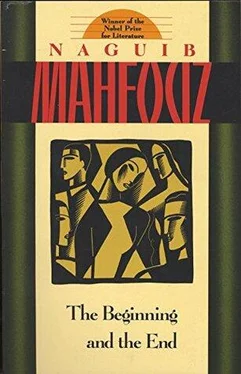Naguib Mahfouz - The Beginning and the End
Здесь есть возможность читать онлайн «Naguib Mahfouz - The Beginning and the End» весь текст электронной книги совершенно бесплатно (целиком полную версию без сокращений). В некоторых случаях можно слушать аудио, скачать через торрент в формате fb2 и присутствует краткое содержание. Год выпуска: 2016, Издательство: Anchor Books, Жанр: Классическая проза, на английском языке. Описание произведения, (предисловие) а так же отзывы посетителей доступны на портале библиотеки ЛибКат.
- Название:The Beginning and the End
- Автор:
- Издательство:Anchor Books
- Жанр:
- Год:2016
- ISBN:нет данных
- Рейтинг книги:4 / 5. Голосов: 1
-
Избранное:Добавить в избранное
- Отзывы:
-
Ваша оценка:
- 80
- 1
- 2
- 3
- 4
- 5
The Beginning and the End: краткое содержание, описание и аннотация
Предлагаем к чтению аннотацию, описание, краткое содержание или предисловие (зависит от того, что написал сам автор книги «The Beginning and the End»). Если вы не нашли необходимую информацию о книге — напишите в комментариях, мы постараемся отыскать её.
The Beginning and the End — читать онлайн бесплатно полную книгу (весь текст) целиком
Ниже представлен текст книги, разбитый по страницам. Система сохранения места последней прочитанной страницы, позволяет с удобством читать онлайн бесплатно книгу «The Beginning and the End», без необходимости каждый раз заново искать на чём Вы остановились. Поставьте закладку, и сможете в любой момент перейти на страницу, на которой закончили чтение.
Интервал:
Закладка:
Finding that his words had no effect, Hassan shrugged his shoulders and dropped the matter. His offer was well-intentioned, in thoughtful consideration for his brothers. But because of their own folly, he thought with sorrow, they would lose the good he intended for them. Though his two brothers did not share his sorrow, their hearts fluttered at the mention of all the food — the meat, pastries, fruits and vegetables, and desserts. They were pained at the thought of missing such delicious things, and their regret increased as the time for supper approached. Since Samira considered this meal superfluous, the family usually went to bed without it. They concealed their hunger so as not to increase her misery and discontent. And so, without uttering a word, the two young men imagined the delicious meals. Meanwhile, Nefisa was engrossed in her own thoughts, which rambled away from the pleasures of life in general and food in particular. Hassan’s talk evoked her sorrows, despair, and fears. In surprise she wondered whether it was really true that her brother Hassan would sing at the wedding party.
THIRTY-SEVEN
At about nine o’clock on the morning after the wedding, Hassan was crossing Al Khazindar Square on his way to Clot Bey Street, where Ali Sabri had asked to meet him. He was tired after the previous night’s party, the memories of which were still fresh in his mind. What a night it had been! He was peerless in his daring. With steady steps, he had cut his way through the crowd to the pavilion constructed on the roof of Amm Gaber Soliman’s house, until he reached the dais amidst applause and shouts of welcome for the new singer. Solemnly greeting his audience, he took a seat in the middle of his band, which consisted of a lute player, a kanum player, and a violinist, who also repeated the refrains. He sang a song entitled “I Am Angry with You as Much as I Love You.” After a while he observed that his audience had become indifferent. Nevertheless, without a care, he continued to sing. He drank a great deal of liquor. At the beginning of the second set many people clamored for a song entitled “In the Forlorn Night.” Since he did not know the song, he began instead to sing another, called “The Garden of Your Beauty.” Very soon, any relationship between the singer and his audience was severed, the singer straining his voice with useless vocalizing, his audience busy with drink and laughter. This embarrassing situation reached its climax when a drunken man stood and addressed the singer, his speech thick from the effects of alcohol.
“I swear by God,” he said, “that if you weren’t a bully I’d ask you to shut up.”
Hassan recognized the man. He was a blacksmith whose shop stood at the opening of Nasr Allah alley. Under his breath Hassan swore to punish him. However, he continued to sing “Gone are the days; the days are gone.”
Quickening his pace, he remembered all that had happened and laughed. What is done cannot be undone, he thought. There’s no reason for me to regret it since I’ve managed to grab the five pounds.
Besides, recollections of the buffet were still lingering in his mind. He proved invincible in the battle over the buffet. He was at his greatest when he swallowed an entire pigeon, bones and all. He was not eating, but devouring, snatching, looting, and quarreling. The battle reached its zenith when the plate of beef was emptied. Seizing the hand of the guest next to him, Hassan forced him to relinquish the meat he had in his hand. But his real feat came after the party was over. Surrounded by the members of his band, who were claiming their pay, he said to them simply, “The food you have eaten is enough.”
When they asked him, “What about the money due to us?” he answered brutally, “Take it by force if you can.”
They went away discontented, angry, and desperate. Only one thing made him very sorry — the fact that his family had not shared the delicious food with him. He wanted to help his mother more than he actually did. But his protracted vagabondage had taught him to be careful, at least as long as his circumstances were bad. He was going toward Clot Bey, the courtesans’ quarter, specifically toward a very narrow path called Darb Tiab, where Ali Sabri was waiting for him. Ali Sabri had opened before him prospects of a life that suited his taste and inflamed his imagination. They had agreed to meet in a coffeehouse in the middle of the darb, across from the house of a courtesan named Zeinab al-Khanfa, called the Twanger because she spoke with a nasal twang.
He climbed the stairs leading to the darb. He quickened his pace between two rows of closed houses, their occupants still asleep. The darb looked deserted. In the small cafés the workers were cleaning up the litter left over from the previous night. Hassan reached the middle of the darb. He saw Ali Sabri sitting before the entrance of the café and walked up to him, greeted him, and sat in a chair by his side. It was no longer the same old café: it looked much newer to him. A few workers were whitewashing the walls, in an attempt to renovate it.
“Here, in this café, where we are sitting, we shall inaugurate a new project, and start a new life,” Ali Sabri said proudly.
Hassan was astonished, because, accustomed though he was to Ali Sabri’s many projects, it was the first time he had heard of this new undertaking, the management of a coffeehouse.
“And what is to become of the band and wedding parties?” he inquired.
Ali Sabri spat with so much force that his spittle reached the walls of Zeinab the Twanger’s house on the other side of the darb.
“The band will be working in this coffeehouse,” he continued. “As for wedding parties, may God convert them into mourning assemblies. The days of true wedding parties are over. Instead of such parties, we now hear of small family gatherings to celebrate the occasion. And the wireless is monopolized by Umm Kalthum, Abdul Wahab, and a bunch of singers who specialize in producing discordant sounds. So it’s impossible for us to earn a decent living in this country.”
Hassan pretended to be dissatisfied with this state of affairs and said, “You are right, Master.” He paused, then asked, “What will the band be doing here?”
Ali Sabri stretched out his legs, which reached the middle of the darb. He pointed to the coffeehouse. “It will be a café during the day,” he said, “and a tavern by night, in which Madam Zeinab’s women will dance. By the way, she is my partner. I, too, shall sing from time to time, and as you see, this is an excellent opportunity to make a good living. If you are interested in working with us, you will have to study the songs of Abdul Wahab.”
“I know almost nothing about them.”
“You will have to learn them, and you will have to study the takatiqs of Umm Kalthum, too. That’s the way things are, and we have to make the best of it.”
“May God be with us,” said Hassan, laughing.
“I’m optimistic,” Ali Sabri added. “This place is blessed. It is to this place that Mohammed al-Arabi is indebted for his wealth,”
Hassan wondered how Ali Sabri had obtained the money to start this new life. Had he gotten it from Zeinab the Twanger? At best, she was over forty. Except for her bovine body, her beauty was gone. But she was a godsend, and her arms were encircled with heavy gold. There was no need to envy Ali Sabri, since Hassan would have his share of the wealth. Now prospects were good, and perhaps the days of vagabondage and hunger would be gone forever.
“But your work as a repeater of refrains is secondary to what you’re expected to do,” Hassan heard his companion say.
“And what am I expected to do?”
Читать дальшеИнтервал:
Закладка:
Похожие книги на «The Beginning and the End»
Представляем Вашему вниманию похожие книги на «The Beginning and the End» списком для выбора. Мы отобрали схожую по названию и смыслу литературу в надежде предоставить читателям больше вариантов отыскать новые, интересные, ещё непрочитанные произведения.
Обсуждение, отзывы о книге «The Beginning and the End» и просто собственные мнения читателей. Оставьте ваши комментарии, напишите, что Вы думаете о произведении, его смысле или главных героях. Укажите что конкретно понравилось, а что нет, и почему Вы так считаете.












